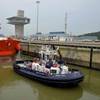160 experts from all over the world have gathered in Brussels on 24 and 25 May for the first meeting of the International Forum on Maritime Spatial Planning. They have discussed ongoing projects both in the EU and abroad and shared views on the challenges of planning public sea space across borders.
The global character of the event stems from the recent alliance between the European Commission and the Intergovernmental Oceanographic Commission of UNESCO (IOC-UNESCO) – an international organisation with a long-standing experience on the issue of maritime spatial planning.
The event is the first of a series, as the Forum is scheduled to meet twice a year between now and 2020. The conclusions drawn along the process will feed into the drafting of a new set of international guidelines on cross-border maritime spatial planning, expected for 2021.
Indeed the Forum is one of the actions mentioned in the 2017 Joint Roadmap to accelerate Marine/Maritime Spatial Planning processes worldwide, in which the European Commission and IOC-UNESCO commit to a number of key initiatives in favour of good ocean governance.
Maritime Spatial Planning is the rational organisation of sea and coastal areas so as to cater for the different – and sometimes competing – needs of various economic activities (such as fisheries, aquaculture, transport, energy and so on) and to make sure they are carried out safely and sustainably. It needs to be negotiated across sectors and across borders
The next Forum session will take place in the autumn and will also be devoted to dialogue and exchanges between planners from different parts of the world.










